Google Pixel 9 Pro XL Review: The premium AI flagship

Google Pixel 9 Pro XL Intro
What is not so good is that Google has hiked the price this year, and the Pixel 9 Pro XL now starts at $1,100, closer than ever to the $1,200 price of the iPhone Pro Max model. And it also looks a lot like an iPhone.
But of course, it’s not an iPhone, it’s an AI phone.
Many of the newly announced Google AI features are related to Gemini, including the incredible Gemini Live, which feels almost indistinguishable from talking to a real person. However, that is available on most other Android phones as well, it’s not a Pixel exclusive.
Other AI features like the photo Reimagine tool you can only get on the Pixel and they allow you to alter photos in crazy ways almost too easily. And yet other AI features like a full integration of Gemini with your Gmail and Google Calendar are yet to come.
In terms of hardware upgrades, the new Tensor G4 chip gets better cooling, so gaming is now much more tolerable, and both battery life and charging are better than before. This might just be the best Android phone of the year, so let’s dive in.
Disclaimer: We use a new review rating system at PhoneArena, and you may notice the total score is now lower than you might be used to. Don’t be fooled that the lower number means the Pixel 9 Pro XL is a bad phone. Instead, the idea is to look at the scores in the context of the price class, and this new Pixel actually scores higher than the average for its price.
Table of Contents:
Also read:
Google Pixel 9 Pro XL Specs
More RAM, a faster chip and faster charging
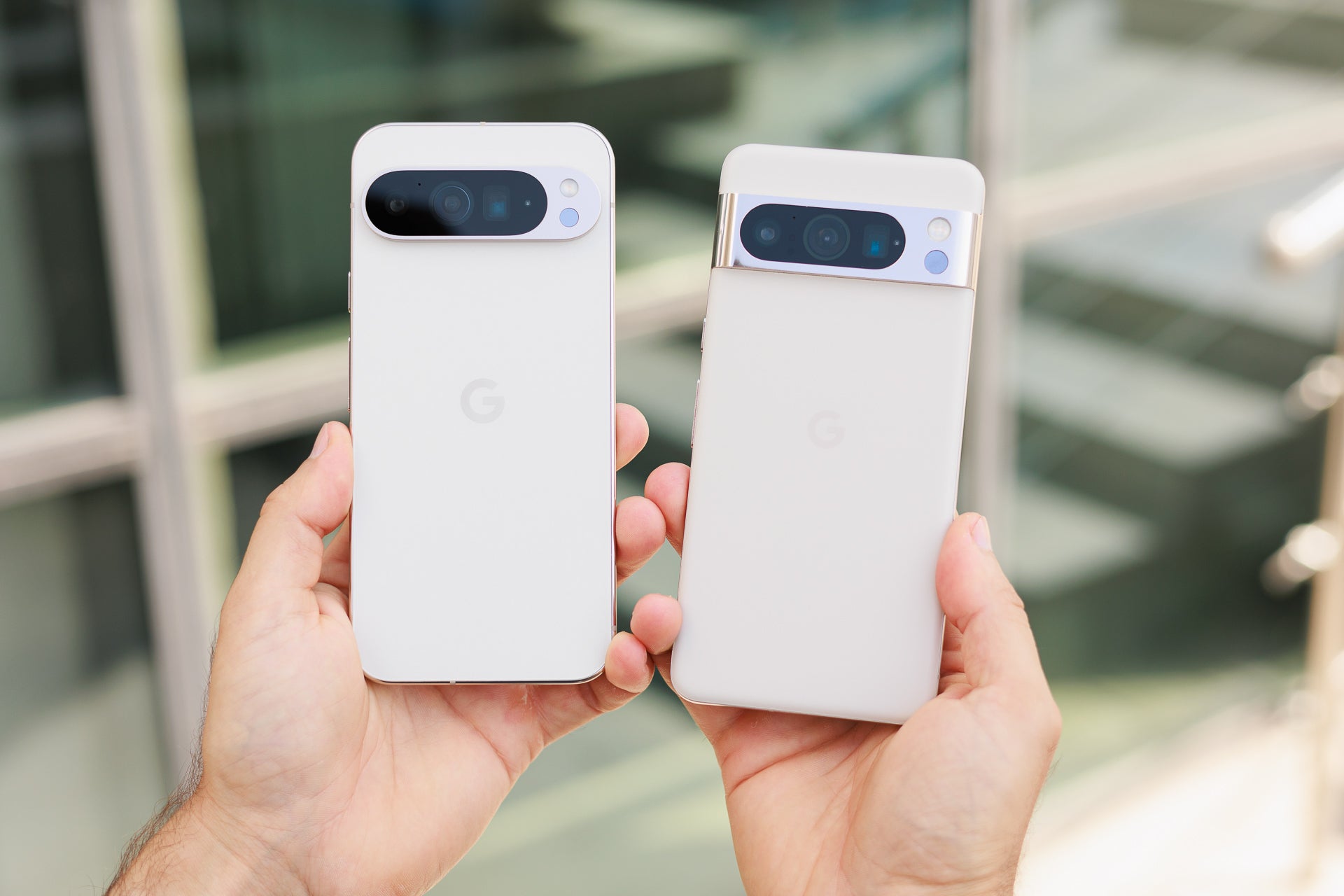

Pixel 9 Pro XL on the left and Pixel 8 Pro on the right
Before we dive in the new features, take a closer look at the hardware differences between the new Pixel 9 Pro XL model and the Pixel 8 Pro from last year:
| Google Pixel 9 Pro XL | Pixel 8 Pro |
|---|---|
| Size 162.8 x 76.6 x 8.5mm 221g |
Size 162.6 x 76.5 x 8.8 mm 213g |
| Display 6.8-inch Super Actua 1344p 1-120Hz |
Display 6.7-inch Super Actua 1344p 1-120Hz |
| Processor Google Tensor G4 16GB RAM |
Processor Google Tensor G3 12GB RAM |
| Storage 128GB – $1,100 256GB – $1,200 512GB – $1,320 1TB – $1,550 |
Storage 128GB – $1,000 256GB – $1,060 512GB – $1,180 1TB – $1,400 |
| Android 14 7 years of OS updates |
Android 14 7 years of OS updates |
| Triple Rear Camera 50MP main, f/1.68, 1/1.31″ sensor 48MP ultra-wide, f/1.7 48MP 5X zoom, f/2.8 42MP front cam |
Triple Rear Camera 50MP main, f/1.7, 1/1.31″ sensor 48MP ultra-wide, f/2.0 48MP 5X zoom, f/2.8 10.5MP front cam |
| Battery 5060 mAh |
Battery 5050 mAh |
| Charging 37W wired charge 23W wireless charging |
Charging 30W wired charge 23W wireless charging |
Google Pixel 9 Pro XL Design and Display
New design with flat sides and an even brighter screen
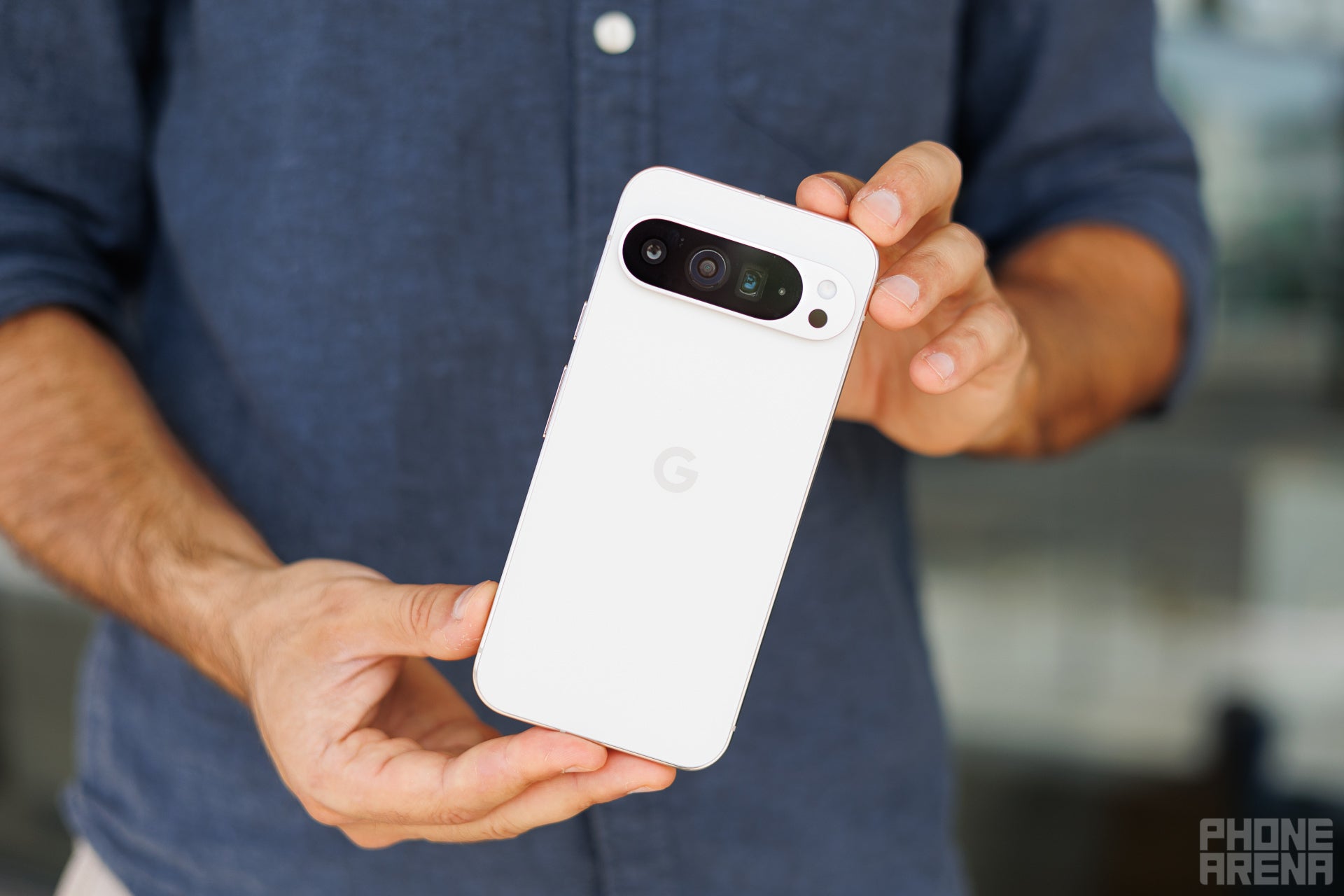

New flat sides transform the look of the Pixel 9 Pro XL (Image by PhoneArena)
Google says this new Pixel is twice more durable compared to last year’s model, which the company seems to measure using drop tests. Since you have the same materials, an aluminum frame and Corning’s Gorilla Glass Victus 2 on the back and front, this seems to be all thanks to the new design, which absorbs impact better.
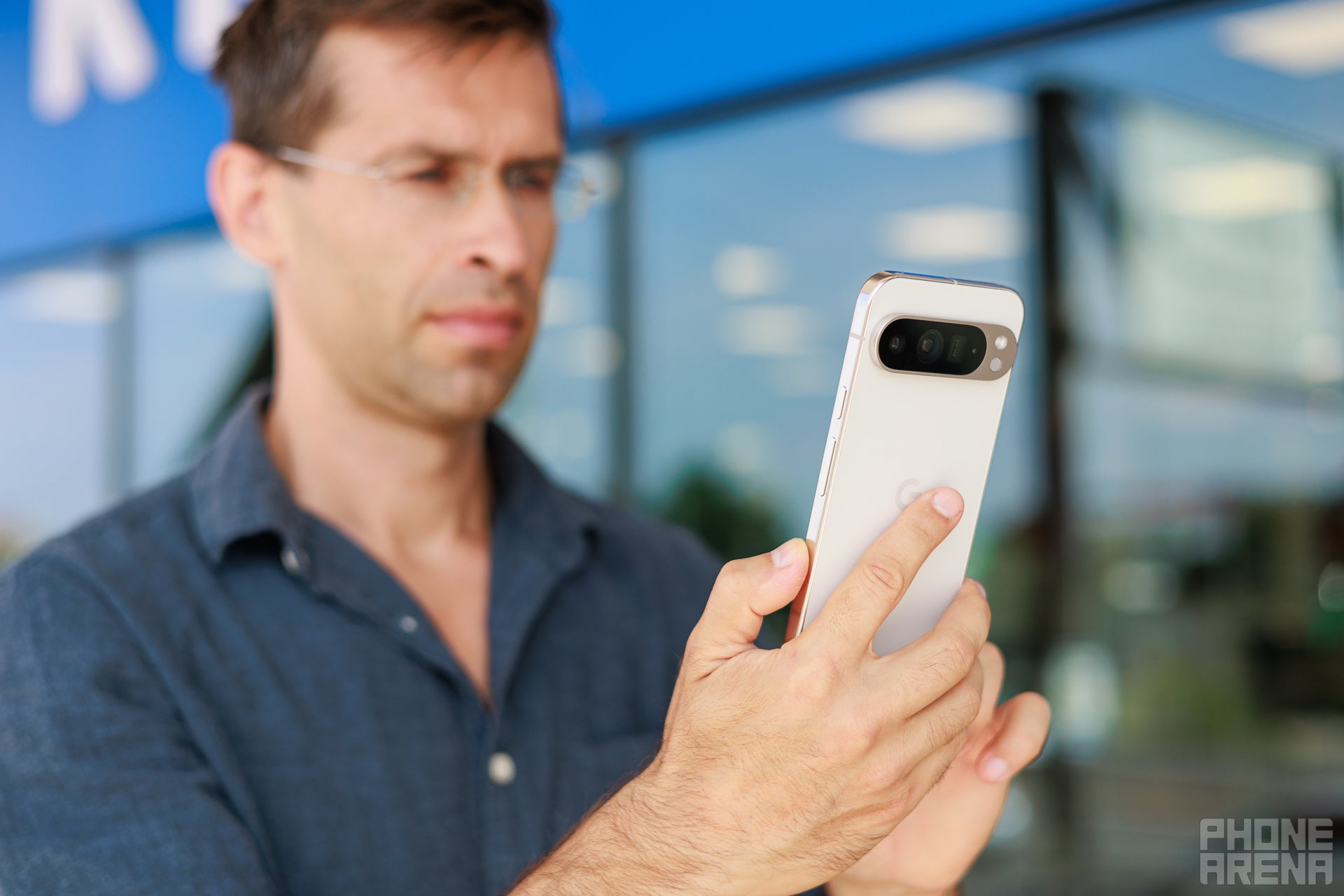

It feels more comfortable to hold (Image by PhoneArena)
The Pixel 9 Pro XL also comes with a matte glass back, so you don’t need to worry about fingerprint marks, and on the sides you have shiny, polished aluminum, which looks cool but that one attracts smudges easily. Standard flagship features like IP68 water and dust protection are of course present too.
You can get the 9 Pro XL in one of these colors:
- Obsidian – black/dark gray color
- Porcelain – warm white
- Hazel – green/brown (somewhat similar to Pixel 7 Pro)
- Rose Quartz – light rose color
We miss the cool blue “Bay” color of the previous generation, but hey, you now have a pink version instead.
In terms of buttons, you have the power and volume keys on the right hand side, a bit higher than before. No fancy Action buttons or Capture buttons here.
Considering this is a premium phone, Google is definitely not being very generous with the unboxing experience. You get a slim box made of recycled materials, where you will find the phone and a 3-feet (1 meter) USB-C cable, but not much else. There is no charger in the box, no case and no screen protector. You will have to purchase all of those separately.
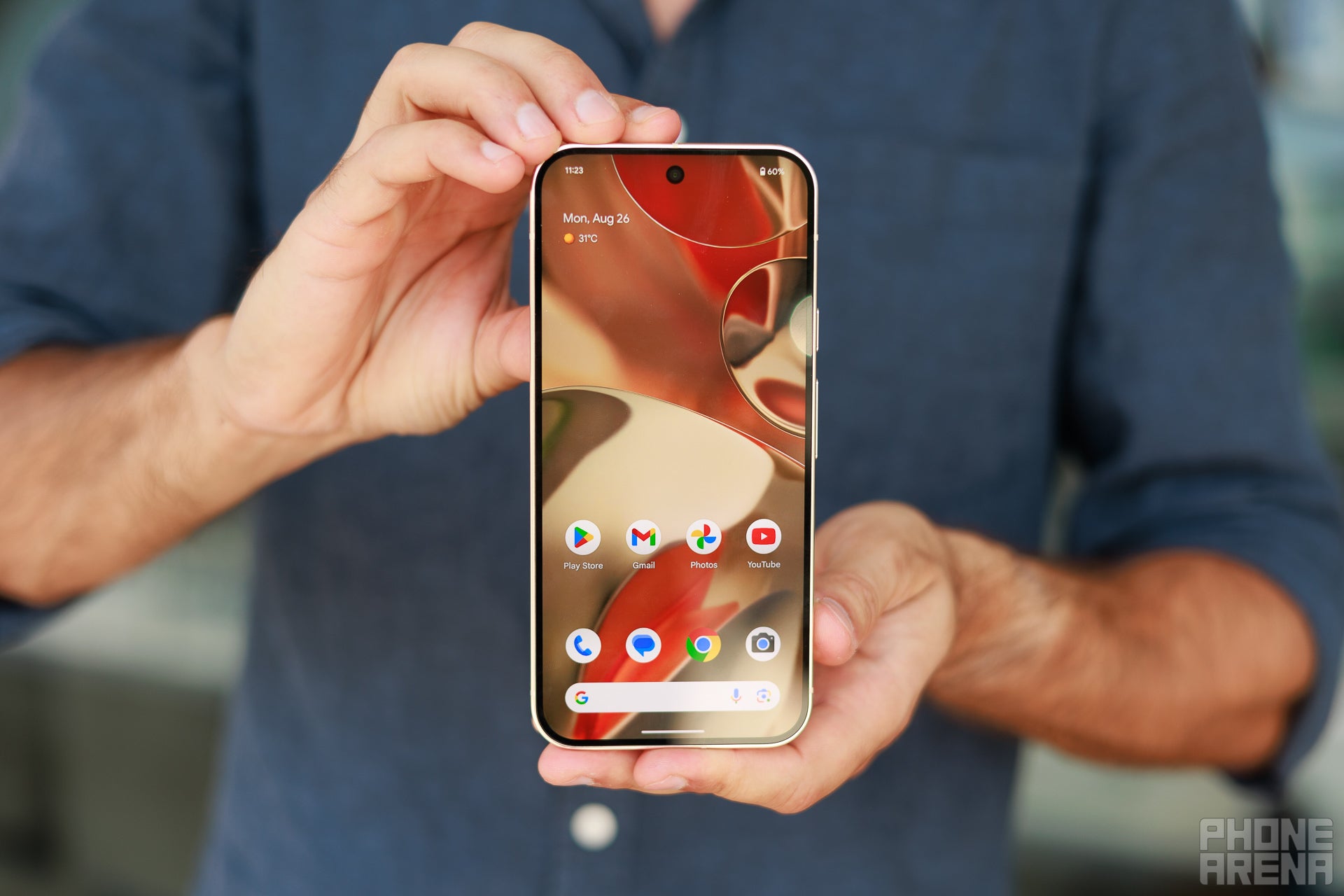

This screen gets super bright (Image by PhoneArena)
The screen size of the 9 Pro XL is only slightly larger, 6.8 inches vs 6.7 inches on the previous model, but that is such a tiny difference in real life that you won’t even notice.
The screen quality, however, has improved, and especially the brightness. The 9 Pro XL reaches peak brightness of 3,000 nits compared to 2,400 nits on the Pixel 8 Pro, which was already one of the brightest phones we have ever tested.
We don’t measure peak brightness (Google gets this number when measuring only 5% white on an otherwise all-black screen), but instead we measure an all-white display. The Pixel 9 Pro XL is the brightest phone we have ever tested, hitting more than 2,000 nits, really impressive.
The rest of the display is the same as before – Google calls this screen “Super Actua”, and the refresh rate can vary from 1Hz for static content to 120Hz. The resolution is also the same as last year, it’s a 1344p display, so it’s definitely sharp enough.
Google Pixel 9 Pro XL Camera
Slight tweaks in image quality, big new AI features
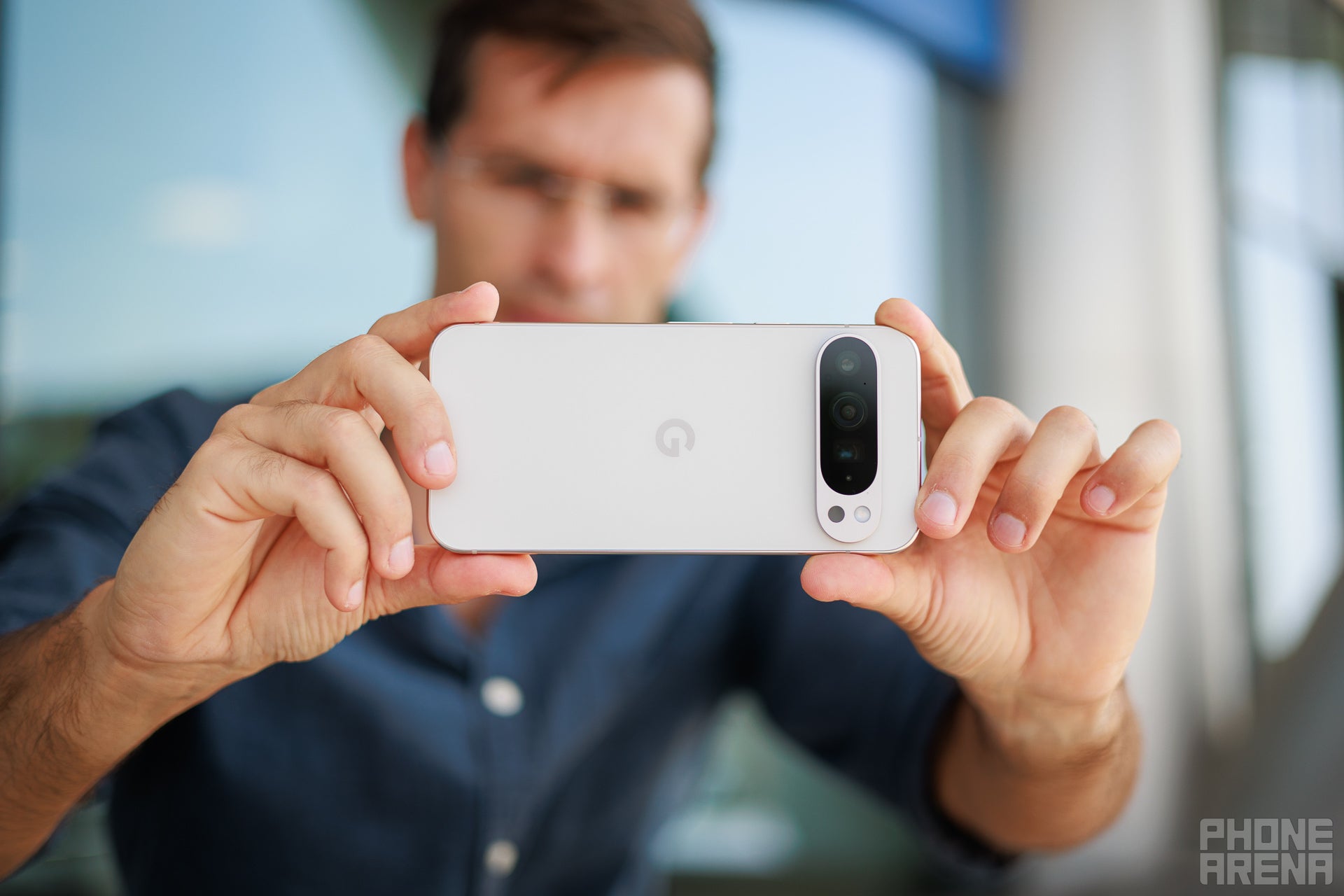

Slight improvements to the rear cameras, and a very wide new front camera (Image by PhoneArena)
The number one reason for getting a new phone for most people seems to be the upgrade to a better camera, so Google had to do something here.
But the camera hardware itself has not changed much. The main camera uses the same 50MP sensor as last year, the 48MP 5X zoom camera also seems to be the same, and you only have a very slight upgrade for the 48MP ultra-wide camera, which gets f/1.7 aperture vs f/2 before.
The 9 Pro XL has gone through our extensive PhoneArena Camera Score testing protocol where we take photos and videos with each individual camera and analyze them scientifically. The results of the test conclude that the Pixel 9 Pro XL is a minor upgrade compared to the 8 Pro.
Many of the improvements actually don’t even come from better detail or image quality, but are camera features that were missing, such as the portrait mode preview, so you can finally see what a portrait photo looks before you take it.
And here is what actual Pixel 9 Pro XL photos look like.
Pixel 9 Pro XL Camera Sample Photos
On top of that, you have all the new Google AI magic.
Add Me – This feature is specifically for your group shots when there is no one around to take your photo. With it, you first take one shot of your friends, and then trade places with them so you can also get in the frame, and they take your picture. The phone helps to get the composition similar for this second shot. Then, it will combine those two pictures, inserting you into the first group photo, so you are with the rest of the group and it seems like somebody just took your picture. We are curious to try this one. It sounds cool, but also potentially a bit finnicky.
Reimagine – This one is a Magic Editor feature, which allows you to do crazy things to a photo and change it completely. For example, you can just type “replace the background with a sunset” and AI will give you several different variations for a sunset background. Or you can add fireworks, or butterflies, or whatever else comes to mind. With such a profound transformation, you begin to wonder if this still qualifies as a “photo” or is it something that should be called otherwise. An “AI photo” maybe?
Auto Frame – This one is again about AI, which has now learned the golden rules of composition and is ready to suggest ways to recompose your imperfectly composed images to something much closer to those golden standards.
Video Boost – This one we know from last year, so it’s not new, but rather an improvement. The way it works is the same – you select a video to “boost” and the system sends it to the Google Cloud, where it gets processed by some supercomputers and in a few hours, you get back an improved version of that video. Google says the processing now takes less time though and your 4K video now returns upscaled to 8K quality. Google even promises this 8K final version is so good, you can take 30MP photo snaps out of the footage and they will look amazing. Again, this all sounded very cool last year, but in reality we almost never used that feature. Let’s see if all the improvements make it worth the hassle and extra processing time.

And in terms of video quality, the Pixel 9 Pro XL is a very slight improvement compared to the previous model.
Google Pixel 9 Pro XL Performance & Benchmarks
More RAM for more AI
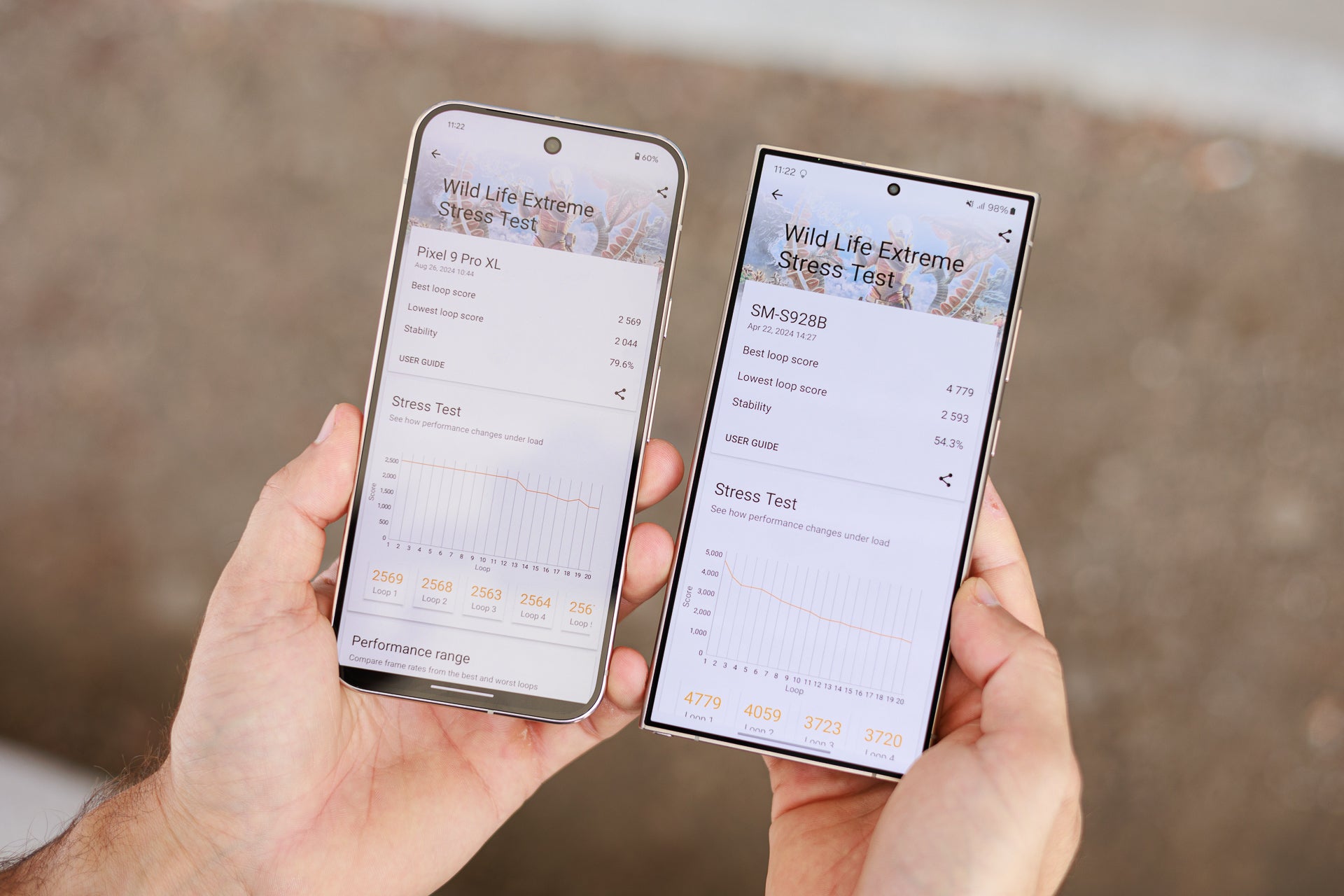

Pixel 9 Pro XL (left) vs Galaxy S24 Ultra (right) in a gaming benchmark
Under the hood, the Pixel 9 Pro XL is powered by the Google Tensor G4 chip, just as all other Pixel 9 series phones. It also has 16GB of RAM, which is an impressive amount. Google says is allocates part of that for AI tasks, which seems like a reasonable thing to do, so you can expect AI to work faster on the Pixel 9 Pro XL compared to previous Pixel editions.
Performance Benchmarks:
As you can see in the benchmarks above, the Pixel 9 Pro XL is behind in CPU performance, as measured by the Geekbench 6 test for both single and multi-core tasks.
For gaming, the good news is that the Tensor G4 heats up less and cools better than before. This means less throttling in gaming and better frame rates, but it is still some 30% slower than the Galaxy S24 Ultra for prolonged gaming sessions (and even slower if your gaming sessions are shorter).
Rumors say the Tensor G4 chip is the last Tensor processor manufactured by Samsung, and the next Tensor G5 chip will be the first made by TSMC, the industry’s leading foundry. This probably means the Pixel 10 series will score a big boost in performance, but that is, allegedly, only happening next year.
Google Pixel 9 Pro XL Software
Speaking of updates, Google maintains its commitment for seven years of major OS updates, which is absolutely fantastic and future-proofs it in a big way.
Let’s see what exactly is new in terms of features (you can bet it’s a lot about AI).
Pixel Studio – this is your AI image generation lab. Type what you want to see, and AI will paint it for you. You can further refine the image to be in a specific style – cartoon-like, cinematic or something else.
As you can see, it was incredibly easy to create these romantic sunset images that look really cool.
However, it was also not too hard to get something more controversial like a photo of this nazi cat.
Weather app – we can’t believe it either! It took Google nearly 20 years to finally admit that a native Weather app is a nice thing to have. This new Weather app has all the hallmark Pixel design quirks and it looks very detailed, and honestly, long, long overdue.
Screenshots app – this one is a cool idea. It collects all of your screenshots in one place and puts the power of AI to help you search that library. This is great. We know we use screenshots to just remember things, and having AI search for that sounds very useful.
Satellite SOS (*only in the US) – a year after Apple, Google is the second company to bring Satellite SOS to its phones, first on the Pixel 9 series. And just like Apple, Satellite SOS will be free on the Pixel 9 phones for the first two years and we don’t know what the price will be after that.
Keep Magic List – a collaboration between Gemini and the Google Keep note-taking app, you can create “magic” lists. The way this works is you can ask Gemini things like “what ingredients do I need to make tacos”, and get the list right in Google Keep.
Call Notes – this one uses on-device AI to create a neat summary of your conversation. Note that the other party will be warned that the call is being recorded.
Google Pixel 9 Pro XL Battery
Similar battery size, but much faster charging
The Pixel 9 Pro XL comes with a 5,060mAh battery, almost the same size as the 5,050mAh battery in the Pixel 8 Pro.
So does this mean battery life is the same? Google says the new Tensor G4 chipset is its most “efficient” processor yet.
And the company itself gives a very vague battery life estimate – it says the Pixel 9 Pro has “24+ hours” battery life, or up to 100 hours with Extreme Battery Saver (the company promised 72 hours with Extreme Battery Saver on the Pixel 8 Pro, so we do have an improvement).
PhoneArena Battery Test Results:
We had to run our in-house battery tests to find out what the real battery numbers are.
We see some big improvements for web browsing, which is our lightest test, so that’s encouraging.
Interestingly, for YouTube video streaming, the new 9 Pro XL lasted an hour less than its predecessor.
Finally, on our 3D gaming test obviously the new cooling had its say and the new Pixel outranked its predecessor by a big margin.
We are also happy to see the 9 Pro XL support faster charging speeds. Google has a new 45W charger that it recommends, but be warned that none of the Pixel 9 phones suppot the full 45W speeds. The Pixel 9 Pro XL is the fastest of the new models, and it maxes out at 37 watts.
PhoneArena Charging Test Results:
This is still great. Google says you can get a 70% charge with a 30 minute top-up. In our testing, we got 63% in half an hour, not quite matching that, but close. And that is still faster than the Pixel 8 Pro which reached only 47% in the same period.
A full 1% to 100% charge takes 1 hour and 23 minutes on the 9 Pro XL compared to 1 hour and 31 minutes on the 8 Pro, not a huge differnce.
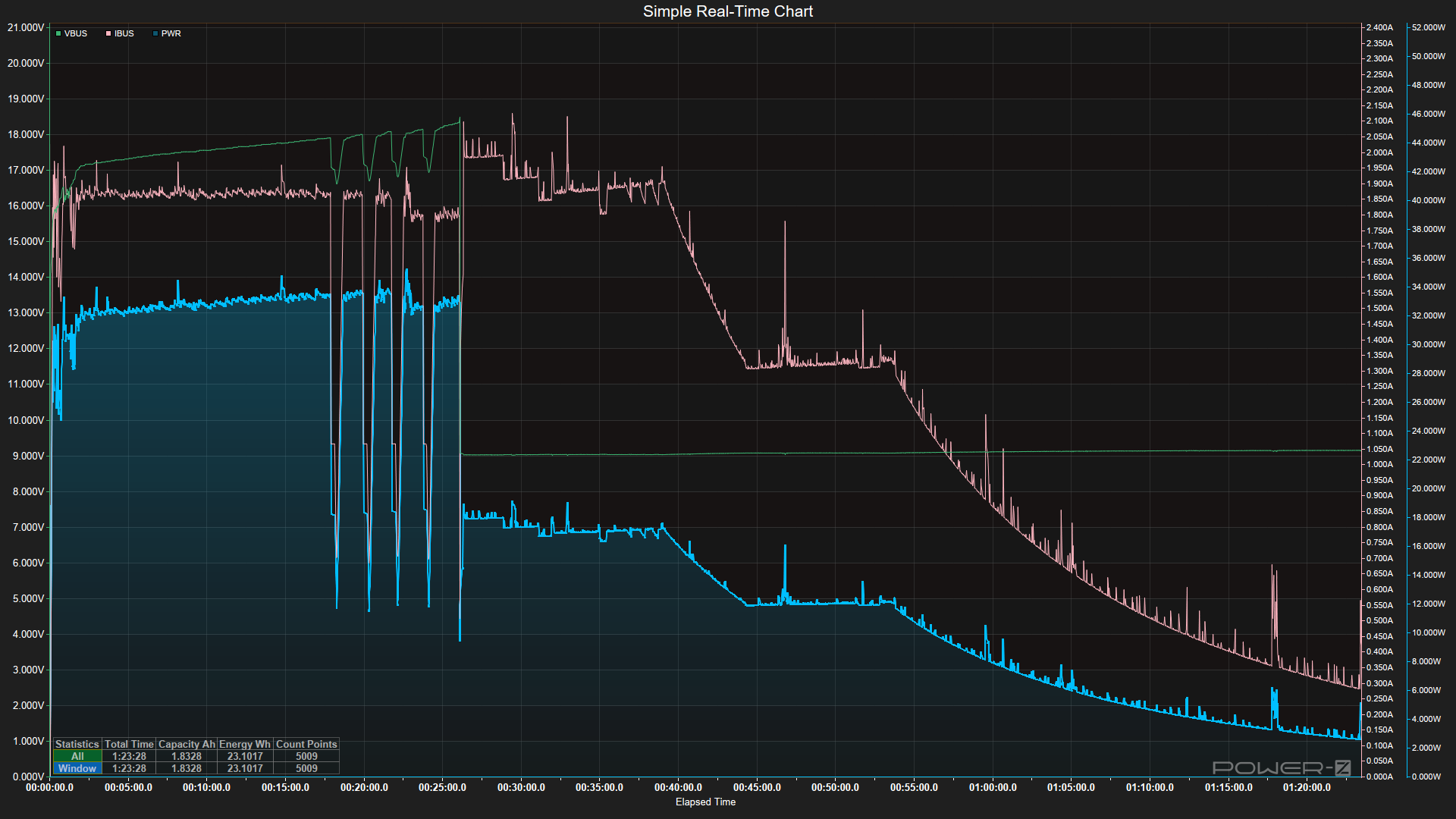

Charging speed graph for 9 Pro XL, we could not hit the advertized 37 watt speed (Image by PhoneArena)
In the chart below that breaks down the charging process, you can see how for the first 25 minutes the phone charges at the maximum speed, which for us was around 34 watts, a bit short of the advertized 37W.
After that, charging speeds drop in half to around 18W, which the phone maintains for 15 more minutes, and then speeds slow down even further.
Wireless charging is also on board, but the speeds have not changed. The Pixel 9 Pro XL wireless charging goes up to 21 watts, but only if you use the Google Pixel Stand 2nd Gen. With a regular Qi charger, the max wireless charging speed is limited to 12W.
Should you buy it?
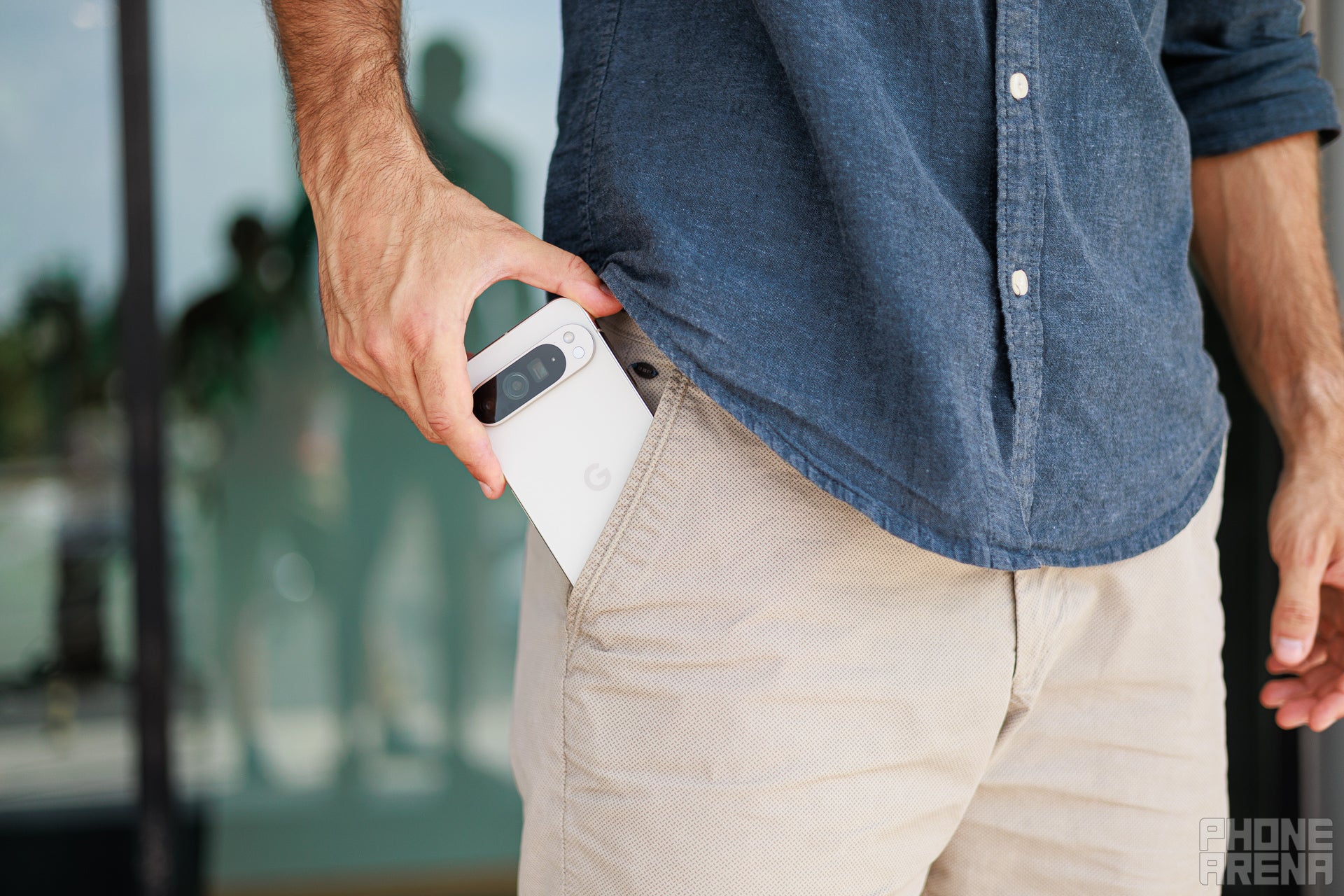

Refined and all about AI (Image by PhoneArena)
The Pixel 9 Pro XL might feel like a bigger upgrade than it is because of all the talk around AI, but many of the most impressive new features such as Gemini Live are not exclusive to the Pixel and are available on most other Android phones too.
This leaves us with a few smaller hardware changes. Out of those, we really like the new design and the improved battery life. We can appreciate the faster Tensor G4 chip and faster charging, but those are not quite game-changers.
Is all of that enough to justify the higher price? Maybe not fully, but this Pixel is still cheaper than the iPhone Pro Max or Galaxy Ultra.
If you already own a recent Pixel phone, you should not feel rushed to upgrade. And if you are considering your options between a Pixel and other phones, let’s put it this way: we feel like the Pixel is ahead for AI than other phones, and if you value that, you should get it. But even if you don’t really care about AI, the 9 Pro XL feels like one very refined, premium flagship, and it deserves a serious consideration from anyone looking for that.
Source link


